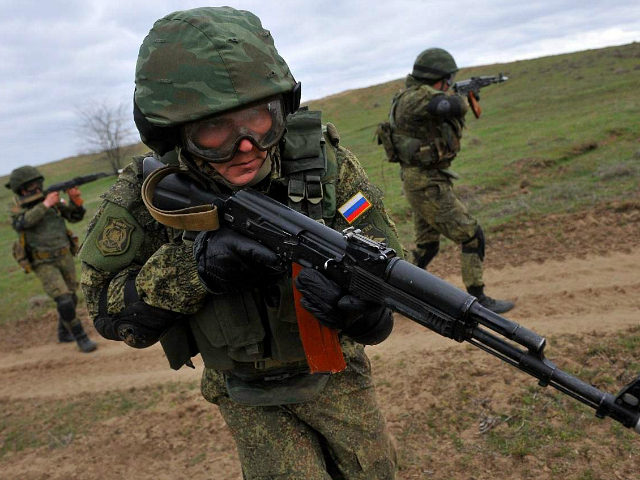NATO officials report Russian forces are moving into position this week for the largest military exercise since the fall of the Soviet Union. 3,200 Chinese troops are expected to join about 300,000 Russians for the war games, with commensurate support from ground vehicles, aircraft, and naval forces.
Voice of America News (VOA) on Wednesday quoted a NATO spokesman saying the war game “demonstrates Russia’s focus on exercising large-scale conflict” and reveals “a more assertive Russia, significantly increasing its defense budget and its military presence.”
VOA added that Russia invited NATO to send observers to the exercise, scheduled to run from September 11 to 15. NATO has not yet announced if it will accept the invitation.
The Russian Defense Ministry said on Wednesday that military forces in the eastern part of the country have been put on high alert and begun holding drills to prepare for the main exercise. Chinese warplanes have also landed at a Russian airbase in the Ural Mountains.
Kremlin spokesman Dmitry Peskov said the show of military force is justified “in the current international situation, which is often quite aggressive and unfriendly to our country.” He said it was possible Russian President Vladimir Putin will observe the exercise in person.
Russia’s TASS news service reported on Wednesday that a group of Russian warships in the Mediterranean task force conducted “anti-sabotage drills” that included drills against both swarms of small boats, a tactic favored by non-state terrorist groups and the Iranian military, and fending off a “notional enemy’s underwater sabotage force.”
Terrorists are not noted for fielding sophisticated underwater sabotage forces capable of taking down warships, but certain other notional adversaries of Russia are renowned for theirs.
Russia and China emphasized their growing alliance against Western powers in an address to the Russian-Chinese Commission on Humanitarian Cooperation by Russia’s ambassador-at-large in China, Yevgeny Tomikhin.
“Russia and China are jointly countering the West’s attempts to introduce a monopoly on the so-called right point of view and information. Amidst the tough information war unleashed by the West, the number of the participants and the coverage in the information work are becoming increasingly important,” Tomikhin said on Wednesday.
Information warfare will certainly be a major element of any future great-power conflict and is arguably part of a low-level conflict current in progress between Russia, China, and the West.
Senior research analyst Michael Kofman of the Center for Naval Analyses told The National Interest last week that however close Russia and China might be growing, one of the major reasons Chinese troops were invited to participate in the forthcoming exercise is that Moscow needed to reassure Beijing it was not practicing for a war against China.
“They had to involve the Chinese to make sure this didn’t appear to be a counter-China exercise, but the scenario will be revealing. China’s participation was a must to avoid the optics that such an exercise might generate, and a good way to solve the inherent distrust between powers is to have them be a part of it,” said Kofman.
The National Interest observed that while Russian officials and media outlets tend to describe the upcoming war game as a generic military fitness exercise with no particular enemy in mind, Chinese media is much more enthusiastic about training with Russia to join forces against the reigning hyperpower of the United States.
A Reuters analysis published on Wednesday proposed that China and Russia are eager to show prospective client states and regional competitors they are a military power equal to the United States and can provide top-notch weapons and training to their allies. That impulse leads to significantly different military goals for the two countries as they flex their military muscles for very different audiences:
Russia sees future wars most likely taking place on land, a repeat of scaled-up versions of 2008 and post-2014 conflicts with neighbors Georgia and Ukraine, in which victory depends on deploying overwhelming military force within a few miles of Russian territory while keeping the United States and other powerful Western states from intervening.
China, meanwhile, sees its most likely wars taking place offshore, either over disputed territories in the South China Sea or Taiwan, which Beijing considers a rogue province and which has long feared mainland China might intervene to snuff out its hopes for independence. As with any territorial ambitions Moscow might have in Europe, however, victory would again depend on keeping U.S. and other allied forces back and out of theater as much as possible for the duration of the war.
Reuters made the same case as the National Interest that despite their rhetoric about joining forces against the United States, Russia and China still do not really trust each other, and their respective strategic planners are pondering numerous scenarios where China attempts to grab Russian territory or vice versa.
One thing Moscow and Beijing seem to wholeheartedly agree on is the urgent need to prevent Western international influence from spreading as reflected in their campaigns to keep the Baltic states out of NATO and isolate Taiwan, respectively.

COMMENTS
Please let us know if you're having issues with commenting.